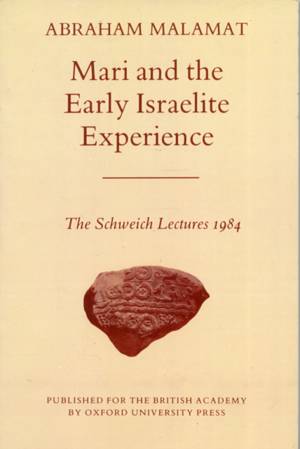
- Retrait gratuit dans votre magasin Club
- 7.000.000 titres dans notre catalogue
- Payer en toute sécurité
- Toujours un magasin près de chez vous
- Retrait gratuit dans votre magasin Club
- 7.000.0000 titres dans notre catalogue
- Payer en toute sécurité
- Toujours un magasin près de chez vous
-
The Schweich Lectures and Biblical Archaeology
Graham Davies
- Livre relié | Anglais | Schweich Lectures on Biblical Archaeology
- The first Schweich Lectures were given by Professor S. R. Driver of Oxford University in 1908 and the British Academy celebrated the centenary of the ... Savoir plus
59,45 €Livraison 2 à 3 semaines59,45 €Livraison 2 à 3 semaines -
Manuscript, Society and Belief in Early Christian Egypt
Colin Henderson Roberts
- Livre relié | Anglais | Schweich Lectures on Biblical Archaeology
- The origins and development of the Church in Egypt remain one of the vexed problems of early Christian history. In his Schweich Lectures, delivered in... Savoir plus
16,95 €Livraison 2 à 3 semaines16,95 €Livraison 2 à 3 semaines -
The Ugaritic Texts and the Origins of West-Semitic Literary Composition
Dennis Pardee
- Livre relié | Anglais | Schweich Lectures on Biblical Archaeology
- The discovery and decryption of Ugaritic cuneiform tablets in the 1920s has given scholars an insight into the development of alphabetic writing and t... Savoir plus
101,95 €Livraison 2 à 3 semaines101,95 €Livraison 2 à 3 semaines -
Hazor
Yigael Yadin
- Livre relié | Anglais | Schweich Lectures on Biblical Archaeology
- Hazor was the largest city in Palestine in the Canaanite period and cultural and a commercial centre of some consequence in the Fertile Crescent, as w... Savoir plus
92,45 €Livraison 1 à 2 semaines92,45 €Livraison 1 à 2 semaines -
Re-Excavating Jerusalem
Kay Prag
- Livre relié | Anglais | Schweich Lectures on Biblical Archaeology
- Re-excavating Jerusalem: Archival Archaeology is concerned with the archaeology and history of Jerusalem, and with the story of its people over many c... Savoir plus
93,45 €Livraison 2 à 3 semaines93,45 €Livraison 2 à 3 semaines -
Ancient Synagogues in Palestine
Jodi Magness
- Livre relié | Anglais | Schweich Lectures on Biblical Archaeology
- Dozens of ancient synagogues have been discovered around the Mediterranean, most of which date to the fourth-sixth centuries CE and are concentrated i... Savoir plus
169,95 €Livraison 2 à 3 semaines169,95 €Livraison 2 à 3 semaines -
Idols of the People
P R S Moorey
- Livre relié | Anglais | Schweich Lectures on Biblical Archaeology
- These lectures investigate the numerous miniature baked clay images from Canaan, Israel and Judah (c. 1600-600 BC). They constitute vital evidence for... Savoir plus
41,95 €Livraison 1 à 2 semaines41,95 €Livraison 1 à 2 semaines -
Nebuchadrezzar and Babylon (pbk)
D J Wiseman
- Livre broché | Anglais | Schweich Lectures on Biblical Archaeology | n° 1983
- This new examination of the region of Nebuchadrezzar II of Babylon (605-562 BC) includes revised interpretations of the Babylonian Chronicles for his ... Savoir plus
101,95 €Livraison 2 à 3 semaines101,95 €Livraison 2 à 3 semaines -
Mari and the Early Israelite Experience
Abraham Malamat
- Livre broché | Anglais | Schweich Lectures on Biblical Archaeology | n° 1984
- The broad spectrum of the Mari documents provides innumerable opportunities for comparative research into Early Israel, the Bible and Biblical Hebrew.... Savoir plus
84,95 €Livraison 2 à 3 semaines84,95 €Livraison 2 à 3 semaines
9 sur 9 résultat(s) affiché(s)













